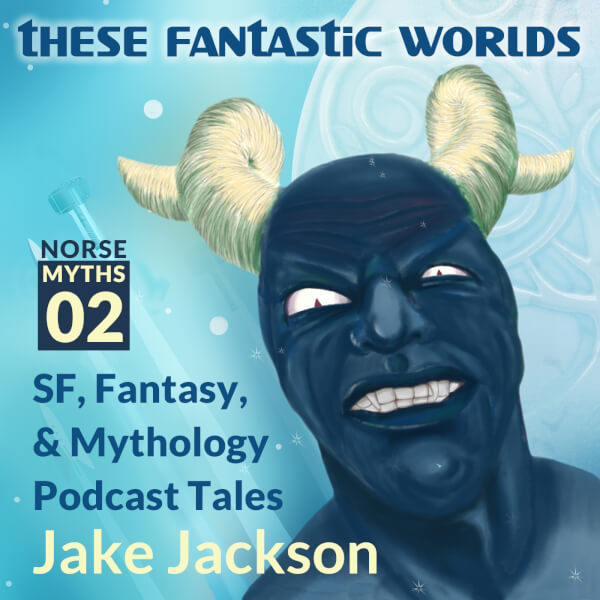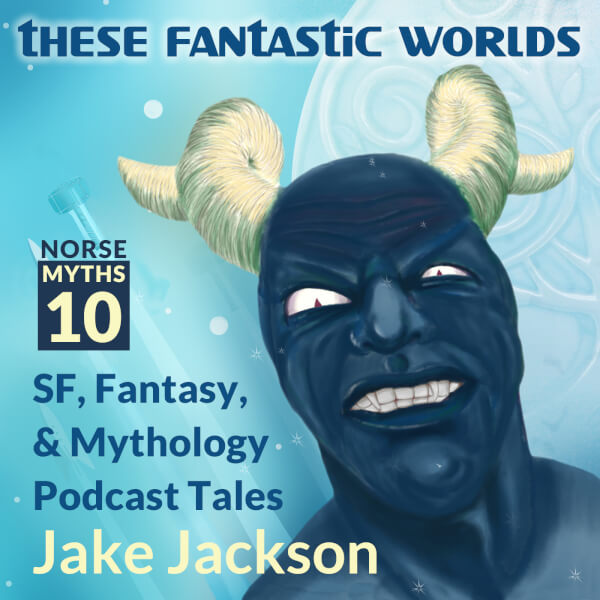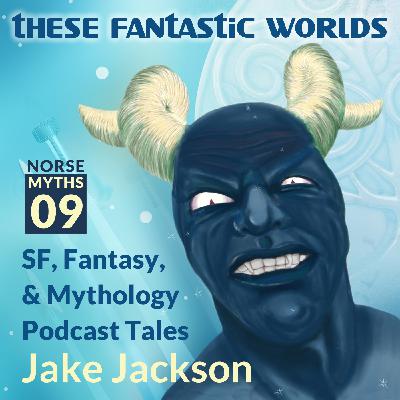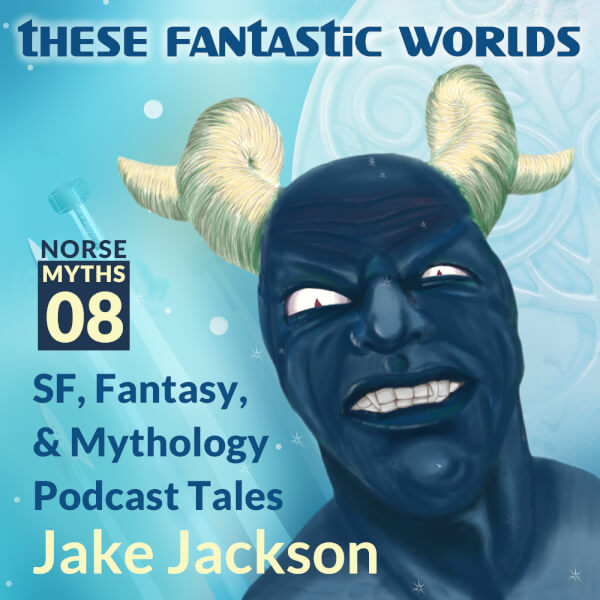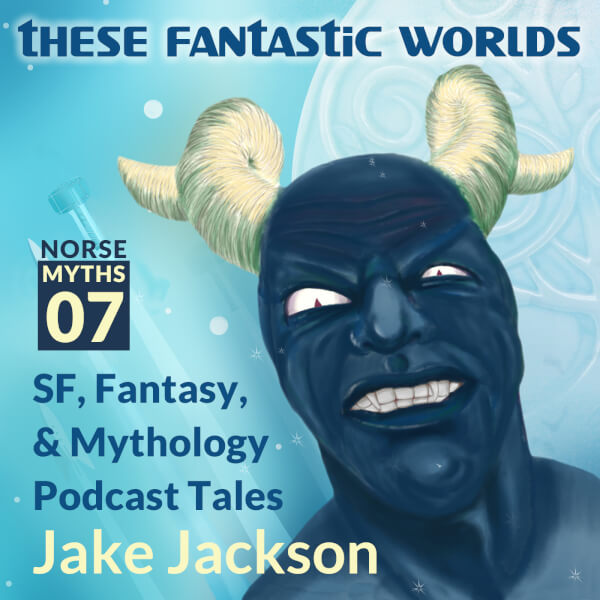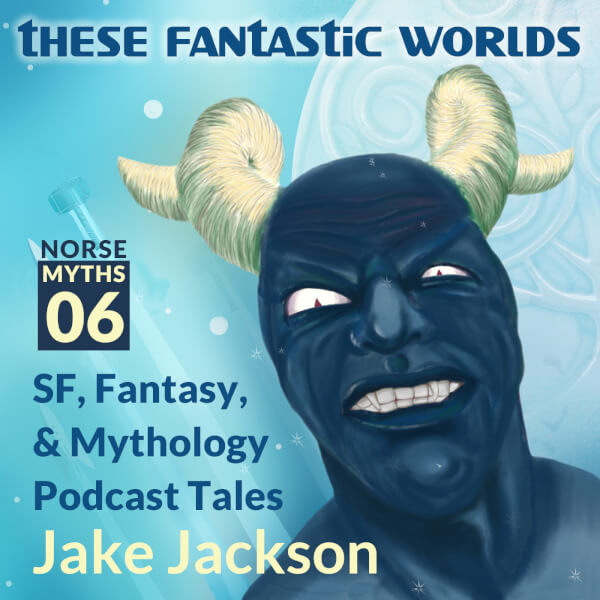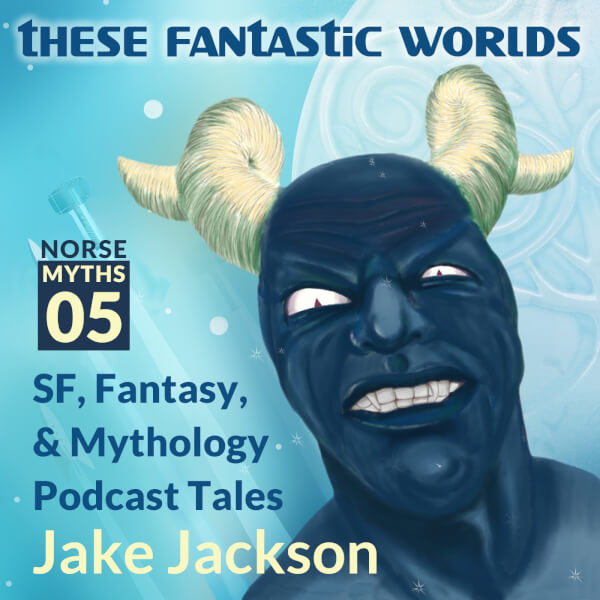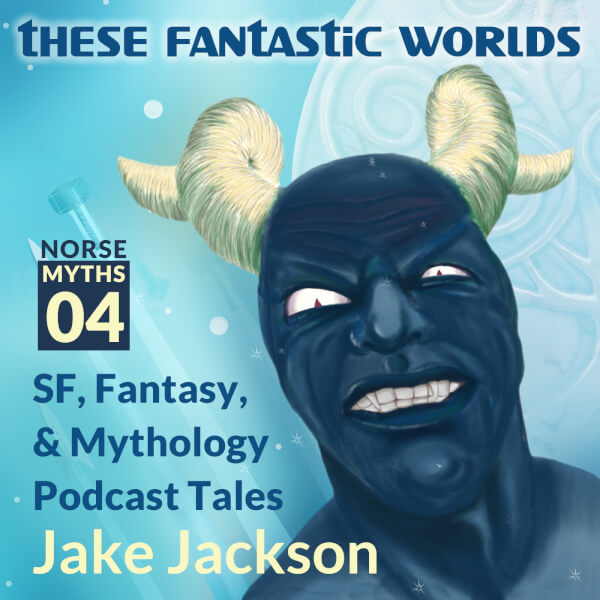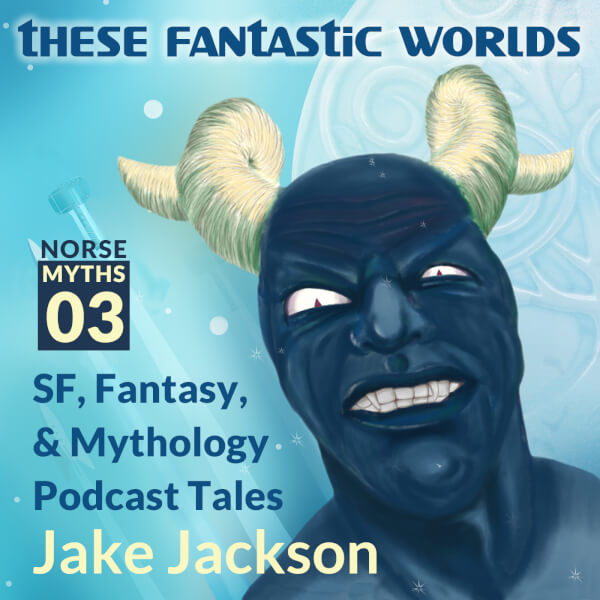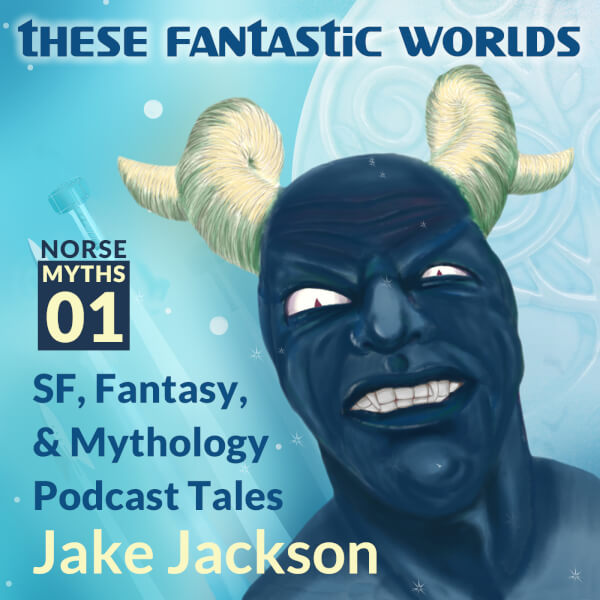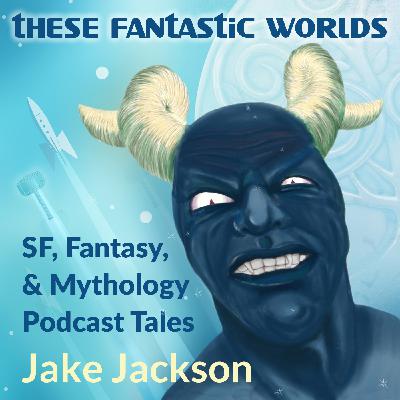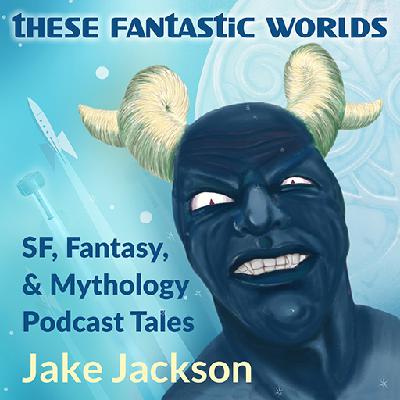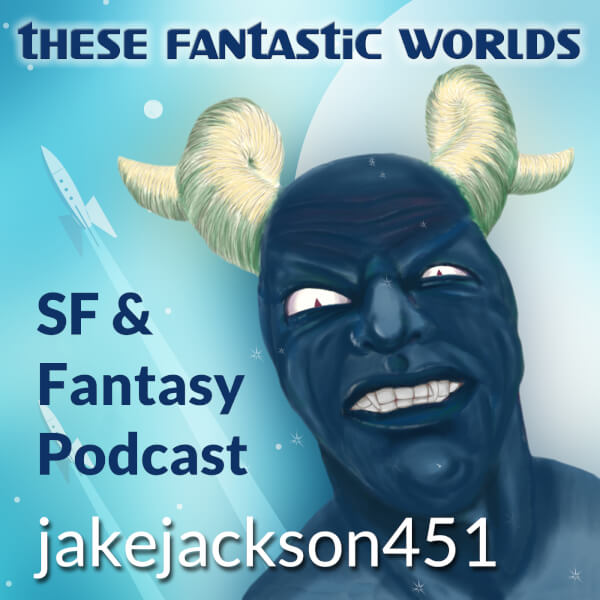102 - Norse Myths 02 - Odin and Frigga
Description
The second of ten Norse myths tells of Odin and Frigga in Valhalla in Asgard, and their sons Thor, Balder and the first gods of the Vikings...
Odin and Frigga in Asgard.
Odin was the son of Bor, and the brother of Vili and Ve. He was the most supreme god of the Northern races and he brought great wisdom to his place at the helm of all gods. He was called Allfather, for all gods were said to have descended from him, and his esteemed seat was Asgard itself. He held a throne there, one in an exalted and prestigious position, and it served as a fine watchtower from which he could look over men on earth, and the other gods in Asgard as they went about their daily business.
***
Odin was a tall, mighty warrior. While not having the brawn of many excellent men, he had wisdom which counted for much more. On his shoulders he carried two ravens, Hugin (thought) and Munin (Memory), and they perched there, as he sat on his throne, and recounted to him the activities in the great wide world. Hugin and Munin were Odin’s eyes and his ears when he was in Asgard and he depended on their bright eyes and alert ears for news of everything that transpired down below. In his hand Odin carried a great spear, Gungnir, which had been forged by dwarfs, and which was so sacred that it could never be broken. On his finger Odin wore a ring, Draupnir, which represented fertility and fruitfulness and which was more valuable to him, and to his land, than anything in any other god’s possession. At the foot of Odin’s throne sat two wolves or hunting hounds, Geri and Freki, and these animals were sacred. If one happened upon them while hunting, success was assured.
Odin belonged to a mysterious region, somewhere between life and death. He was more subtle and more dangerous than any of the other gods, and his name in some dialects means ‘wind’, for he could be both forceful and gentle, and then elusive or absent. On the battlefield, Odin would dress as an old man – indeed, Odin had many disguises, for when things changed in Asgard, and became bad, he had reason to travel on the earth to uncover many secrets – attended by ravens, wolves and the Valkyrs, who were the ‘choosers of the slain’, the maidens who took the souls of fallen warriors to Valhalla.
Valhalla was Odin’s palace at Asgard, and its grandeur was breathtaking. Valhalla means ‘hall of the chosen slain’, and it had five hundred great wooden doors, which were wide enough to allow eight hundred warriors to pass, breastplate to breastplate. The walls were made of glittering spears, polished until they gleamed like silver, and the roof was a sea of golden shields which shone like the sun itself. In Odin’s great hall were huge banqueting tables, where the Einheriar, or warriors favoured by Odin, were served. The tables were laden with the finest horns of mead, and platters of roast boar. Like everything else in Asgard, Valhalla was enchanted. Even the boar was divine and Saehrimnir, as he was called, was slain daily by the cook, boiled and roasted and served each night in tender, succulent morsels, and then brought back to life again the following day, for the procedure to take place once again. After the meal, the warriors would retire to the palace forecourt where they would engage in unmatched feats of arms for all to see. Those who were injured would be healed instantly by the enchantment of Valhalla, and those who watched became even finer warriors.
Odin lived in Asgard with Frigga, who was the mother-goddess and his wife. Frigga was daughter of Fiogyn and sister of Jord, and she was greatly beloved on earth and in Asgard. She was goddess of the atmosphere and the clouds, and she wore garments that were as white as the snow-laden mountains that gently touched the land of Asgard. As mother of all, Frigga carried about her a heady scent of the earth – blossoming flowers, ripened fruit, and luscious greenery. There are many stories told about Frigga, as we will discover below.
Life in Asgard was one of profound comfort and grace. Each day dawned new and fresh for the passage of time had not been accorded to Asgard and nothing changed except to be renewed. The sun rose each day, never too hot, and the clouds gently cooled the air as the day waned. Each night the sky was lit with glistening stars, and the fresh, rich white moon rose in the sky and lit all with her milky light. There was no evil in Asgard and the good was as pure as the water, as the air, and as the thoughts of each god and goddess as he and she slept.
In the fields, cows grazed on verdant green grass and in the trees birds caught a melody and tossed it from branch to branch until the whole world sang with their splendid music. The wind wove its way through the trees, across the mountains, and under the sea-blue skies – kissing ripples into the streams and turning a leaf to best advantage. There was a peace and harmony that exists for that magical moment just before spring turns to summer, and it was that moment at which Asgard was suspended for all time.
And so it was that Odin and Frigga brought up their young family here, away from the darkness on the other side, far from the clutches of change and disharmony. There were nine worlds in Yggdrasill, the World Ash, which stretched out from Asgard as far as the eye could see. At the top there was Aesir, and in the bottom was the dead world of Hel, at the Tree’s lowest roots. In between were the Vanir, the light elves, the dark elves, men, frost and hill giants, dwarfs and the giants of Muspell.
Frigga kept her own palace in Asgard, called Fensalir, and from his high throne Odin could see her there, hard at her work. Frigga’s palace was called the hall of mists, and she sat with her spinning wheel, spinning golden threat or long webs of bright-coloured clouds with a marvellous, jewelled spinning wheel which could be seen as a constellation in the night’s sky.
There was a story told once of Frigga, one in which her customary goodness and grace were compromised. Frigga was a slim and elegant goddess, and she took great pride in her appearance – something the later Christians would consider to be a sin, but which the Vikings understood, and indeed encouraged. She had long silky hair and she dressed herself in exquisite finery, and Odin showered her with gifts of gems and finely wrought precious metals. She lived contentedly, for her husband was generous, until the day came when she spied a splendid golden ornament which had been fastened to a statue of her husband. As the seamless darkness of Asgard fell one evening, she slipped out and snatched the ornament, entrusting it to dwarfs whom she asked to forge her the finest of necklaces. When the jewel was complete, it was the most beautiful decoration ever seen on any woman – goddess or humankind – and it made her more attractive to Odin so that he plied her with even more gifts, and more love than ever. Soon, however, he discovered that his decoration had been stolen, and he called together all of the dwarfs and with all the fury of a god demanded that this treacherous act be explained. Now Frigga was beloved both by god and dwarf, and although the dwarfs were at risk of death at the hand of Odin, they remained loyal to Frigga, and would not tell Allfather who had stolen the golden ornament.
Odin’s anger knew no bounds. The silence of the dwarfs meant only one thing to him – treason – and he swore to find out the real thief by daybreak. And so it was that on that night Odin commanded that the statue be placed above the gates of the palace, and he began to devise runes which would enable it to talk, and to betray the thief. Frigga’s blood turned cold when she heard this commandment, for Odin was a kind and generous god when he was happy and content, but when he was crossed, there was a blackness in his nature that put them all in danger. There was every possibility that Frigga would be cast out of Asgard if he were to know of her deceit, and it was at the expense of everything that she intended to keep it a secret.
Frigga called out to her favourite attendant, Fulla, and begged her to find some way to protect her from Odin. Fulla disappeared and several hours later returned with a hideous and frightening dwarf who insisted that he could prevent the secret from being uncovered, if Frigga would do him the honour of smiling kindly on him. Frigga agreed at once, and that night, instead of revealing all, the statue was smashed to pieces while the unwitting guards slept, drugged by the ugly dwarf.
Odin was so enraged by this new travesty that he left Asgard at once – disappearing into the night and taking with him all of the blessings he had laid upon Asgard. And in his absence, Asgard and the worlds around turned cold. Odin’s brothers, it is said, stepped into his place, taking on his appearance in order to persuade the gods and men that all was well, but they had not his power or his great goodness and soon enough the frost-giants invaded the earth and cast across the land a white blanket of snow. The trees were stripped of their finery, the sun-kissed streams froze and forgot how to gurgle their happy song. Birds left the trees and cows huddled together in frosty paddocks. The clouds joined together and became an impenetrable mist and the wind howled and scowled through the barren rock.
For seven months Asgard stood frozen until the hearts of each man within it became frosted with unhappiness, and then Odin return

